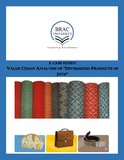Value chain analysis of diversified products of jute
Abstract
Jute diversified products industry of Bangladesh is an informal, unstructured and niche market compared to the competitive countries like India.Having the second position among jute production countries, the country’s JDP industry is under privileged. The sector contributes about 5% to total foreign exchange earnings and 4% to country’s GDP. Bangladesh produces the world's best quality jute, and for many years jute had been the largest contributor to the country’s export earnings. However, in the 1980s/90s the emergence of cheaper synthetic substitutes caused the world market for jute to shrink. Domestic demand also declined because of the inefficiency of state-owned jute mills & the absence of government policies to encourage domestic consumption. In recent years, increasing concern with environmental issues and volatile price of petroleum based raw materials have opened up new market opportunities for jute products; consequently Bangladesh jute sector has seen a slight revival.
In spite of having low shares in JDP sales revenue, some diversified jute products are recently coming forth likely to be potentially high selling items in the near future. Those are jute fiber reinforced sheet, jute geo-textile such as nursery/plantation pot etc.
Constraints in this subsector are Lack of availability in smaller unit of inputs causes to lower quality JDP which is not competent enough to international market; Insufficient supply of large volume inputs, Higher input costs leading to high cost of JDP; Lack of knowledge on product development techniques leads to manufacturing limited variation of JDP products; Unavailability of skilled labor in JDP industry results in low quality products and leads to lower market price; Unavailability of dedicated training service providers in JDP industry results in unskilled workers and entrepreneurs to run their business efficiently; Infrequent orders for JDP products results in high cost for retaining workers round the year; JDP MSMEs get order sporadically as they have no established forward market from which they can get product order round the year.
The study identified opportunities to promote sub-contracting between large buyers and MSMEs. Few enterprises are practicing outsourcing especially when they have large product order. MSMEs are interested to be part of sub-contracting with large JDP buyers or exporters. The present out-sourcing model is informal and unstructured. So, there is opportunity to promote sustainable sub-contracting model between large buyers and MSMEs.

